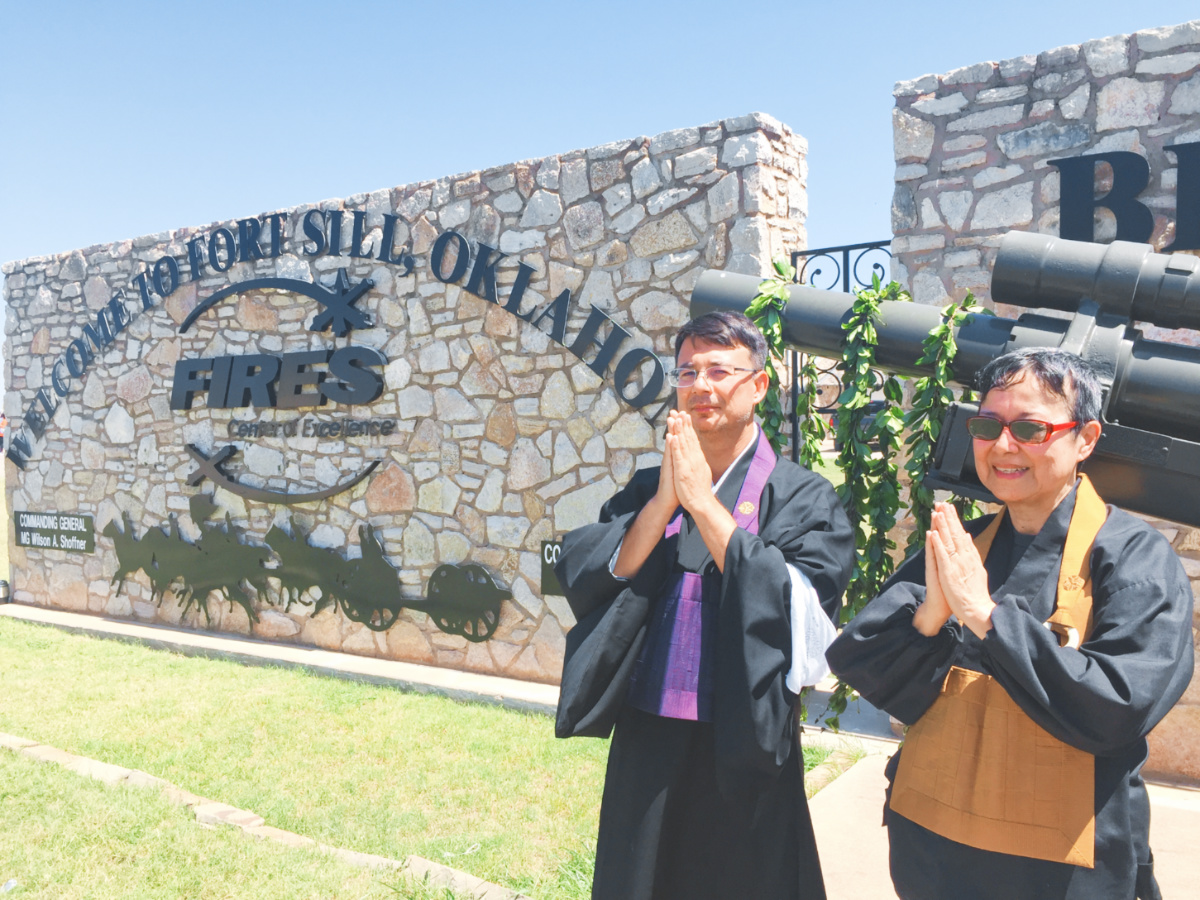
Rev. Duncan Williams and Rev. Egyoku Nakao conduct a peaceful prayer service at Fort Sill in front of a U.S. Army artillery weapon draped with leis, donated by the Oshima family, that the group brought with them. Kanesaburo Oshima was killed by a guard while incarcerated at Fort Sill during World War II on May 12, 1942, at the age of 58.
Tsuru for Solidarity and Buddhist priests join together to voice opposition against the unjust detention of migrant youth.
More than 400 people from across the country converged on Lawton, Okla., on July 20 to participate in a second protest at Fort Sill, where the Trump Administration announced plans to incarcerate an estimated 1,400 asylum-seeking migrant children as early as next month.
Tsuru for Solidarity members and a delegation of Buddhist priests joined the protest rally. Many of the Japanese Americans and their supporters had participated in a similar protest rally in front of Fort Sill on June 22.
Protesters braved the more than 100-degree heat and closed down the street leading into Fort Sill. Unlike the heavy-handed tactics taken by the military police on June 22, there were no visible military police or Lawton police officers present at this protest.
Rev. Duncan Ryuken Williams led the delegation of Buddhist priests. Following a Buddhist memorial service, Williams placed leis on a field artillery display in front of Fort Sill.
Before Mike Ishii, one of the co-founders of Tsuru for Solidarity — created by Japanese American survivors and descendants of former WWII prison camps for those of Japanese ancestry — led the group in a “Close the Camps” chant, he said, “This is nothing. If you bring the children here, every one of us represents thousands and thousands of people back home. And we will come back. You haven’t seen anything yet.”
Tsuru for Solidarity members who participated in the rally with Ishii included Becca Asaki, Linda Morris, Lauren Sumida and Carl Takei.
Williams was able to organize a Sangha Support Group comprised of 129 Buddhist priests and laypersons, guided by a seven-member steering committee.
Buddhist priests who were able to attend the Fort Sill rally included:
- Rev. Duncan Ryuken Williams, committee chair and author of “American Sutra”
- Rev. William Briones, Los Angeles Honpa Hongwangi Buddhist Temple (Nishi Hongwangi)
- Rev. Ryuji Hayashi, Koyasan Beikoku Betsuin of Los Angeles
- Rev. Shumyo Kojima, Zenshuji Soto Mission
- Rev. Myozen Joan Amaral, Zen Center of North Shore
- Rev. Gyokuko Carlson, Dharma Rain Zen Center
- Rev. Eijun Linda Ruth Cutts, San Francisco Zen Center
- Rev. Zenshin Greg Fain, Tassajara Zen Mountain Center
- Jitsujo Tina Gauthier, ZCLA
- Rev. Jisan Tova Green, San Francisco Zen Center
- Rev. Gesshin Greenwood, Institute of Buddhist Studies & Empty Moon Zen Sangha
- Juliet Hwang, Plum Village Community of Engaged Buddhism
- Rev. Michael Mui Lewis, Great Mountain Zen Center
- Roshi Wendy Egyoku Nakao, Zen Center of Los Angeles
- Stephen Nakasone, Los Angeles Higashi Hongwanji Temple board member
- Judy Nakatomi, Plum Village Community of Engaged Buddhism
- Kenley Neufeld, Dharmacharya, Plum Village Community of Engaged Buddhism
- Rev. Inryu Bobbi Ponce-Barger, All Beings Sangha
- Rev. Tenku Ruff, Soto Zen Buddhist Assn.
- Kairen Eric Russell
- Roshi Grace Schireson, Shogaku Zen Institute
Fort Sill has a long history of incarcerating people of color. During World War II, Fort Sill held 700 people of Japanese ancestry. Prior to this, Fort Sill imprisoned different indigenous tribes, including Comanches and Apaches. Some of those who participated in the July 20 rally were also descendants of the Trail of Tears.



